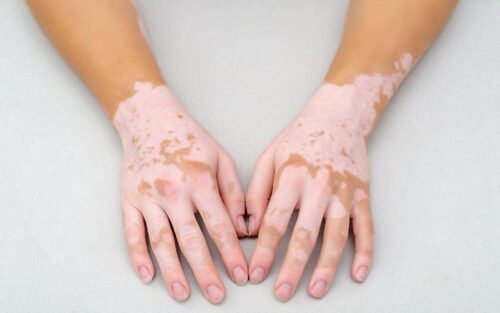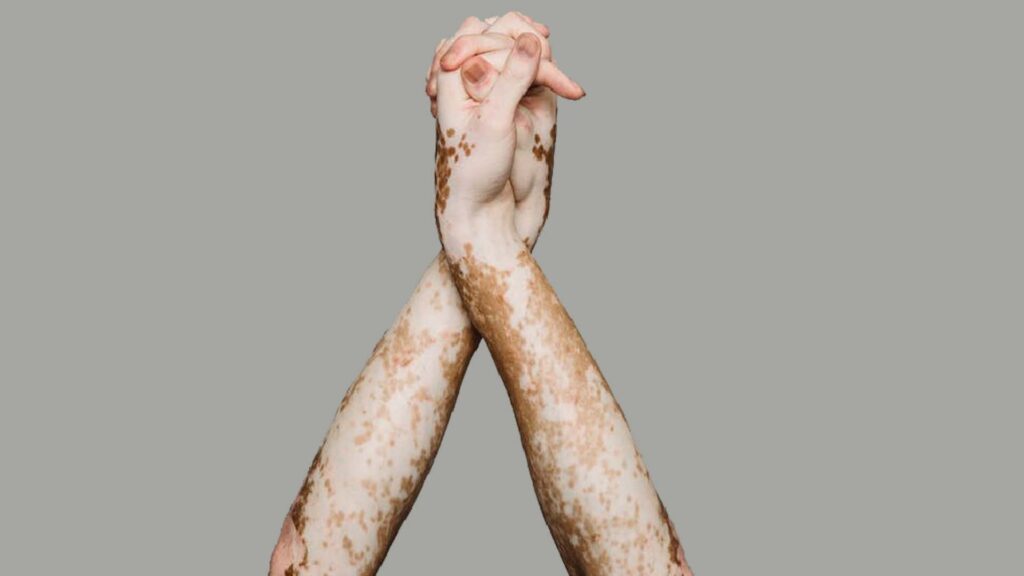
Vitiligo Stress
How can people cope with the emotional and psychological aspects from vitiligo stress ?
Vitiligo Stress, Causes & Relief – Although vitiligo is usually not harmful medically, its emotional and psychological effects can be devastating. White patches of vitiligo can affect emotional and psychological well-being and self-esteem. People with vitiligo can experience emotional stress, particularly if the condition develops on visible areas of the body (such as the face, hands, arms, and feet) or on the genitals. Adolescents, who are often particularly concerned about their appearance, can be devastated by widespread vitiligo. Some people who have vitiligo feel embarrassed, ashamed, depressed, or worried about how others will react.
Fortunately, there are several strategies to help people cope with vitiligo. Also, various treatments, can minimize, camouflage, or, in some cases, even eliminate white patches. First, it is important to find a doctor who is knowledgeable about the disorder and takes it seriously. You must let your doctor know if you are feeling depressed, because doctors and other mental health professionals can help people deal with depression. You should also learn as much as possible about the disorder and treatment choices so that you can participate in making important decisions about your medical care.
Vitiligo Treatment
The main goal of treating vitiligo is to reduce the contrast in color between affected and unaffected skin. The choice of therapy depends on the number of white patches; their location, sizes, and how widespread they are; and what you prefer in terms of treatment. Each patient responds differently to therapy, and a particular treatment may not work for everyone. Current treatment options for vitiligo include medication, surgery, and adjunctive therapies (used along with surgical or medical treatments).
Medical Therapies
A number of medical therapies, most of which are applied topically, can reduce the appearance of vitiligo. These are some of the most commonly used.

Topical Therapy
Creams, including corticosteroids, may be helpful in repigmenting (returning the color to) white patches, particularly if they are applied in the initial stages of the disease. Corticosteroids are a group of drugs similar to hormones such as cortisone, which are produced by the adrenal glands. Yet, as with any medication, these creams can cause side effects. For this reason, the doctor will monitor you closely for skin shrinkage and skin striae (streaks or lines on the skin).
Light Treatment
Light therapy or excimer laser treatments are also used to treat vitiligo, although multiple treatments are needed and results may not be permanent.
Psoralen photochemotherapy. Also known as psoralen and ultraviolet A (PUVA) therapy, this is an effective treatment for many patients. The goal of PUVA therapy is to repigment the white patches. However, it is time consuming, and care must be taken to avoid side effects, which can sometimes be severe. Psoralen is a drug that contains chemicals that react with ultraviolet light to cause darkening of the skin.
The treatment involves taking psoralen by mouth (orally) or applying it to the skin (topically). This is followed by carefully timed exposure to sunlight or to ultraviolet A (UVA) light that comes from a special lamp. You must minimize exposure to sunlight at other times.
Known side effects of oral psoralen include sunburn, nausea and vomiting, itching, abnormal hair growth, and hyperpigmentation. Oral psoralen photochemotherapy may also increase the risk of skin cancer, although the risk is minimal at doses used for vitiligo. If you are undergoing oral PUVA therapy, you will be advised to apply sunscreen, avoid direct sunlight, and wear protective UVA sunglasses for a period of time after each treatment.
Depigmentation
This treatment involves fading the rest of the skin on the body to match the areas that are already white. For people who have vitiligo on more than 50 percent of their bodies, depigmentation may be recommended. Patients apply cream once or twice a day to pigmented areas until they match the already depigmented areas.
The major side effect of depigmentation therapy is inflammation (redness and swelling) of the skin. You may also experience itching or dry skin. Depigmentation tends to be permanent, is time consuming, and is not easily reversed. In addition, a person who undergoes depigmentation will always be unusually sensitive to sunlight.
Surgical Therapies
Surgical techniques may be an option when topical creams and light therapy do not work. Surgery is typically not recommended for people who scar easily or develop keloids. A variety of effective procedures are available. Talk to your doctor about whether a surgical approach may be right for you.
Additional Therapies
In addition to medical and surgical therapies, there are many things you can do on your own to protect your skin, minimize the appearance of white patches, and cope with the emotional aspects from vitiligo stress.
Sunscreens
People, who have vitiligo, particularly those with fair skin, should minimize sun exposure and use a sunscreen that provides protection from both UVA and ultraviolet B light. Tanning makes the contrast between normal and depigmented skin more noticeable. Sunscreen helps protect the skin from sunburn and long-term damage.
Cosmetics
Some patients with vitiligo cover depigmented patches with makeup, self-tanning lotions or dyes. These cosmetic products can be particularly effective for people whose vitiligo is limited to exposed areas of the body.
Counselling and support groups
Many people with vitiligo find it helpful to get counselling from a mental health professional. People often find they can talk to a counsellor about issues that are difficult to discuss with anyone else. A mental health counsellor can also offer support and help in coping with vitiligo stress. In addition, it may be helpful to attend a vitiligo support group.
SO CHEER UP AND TRACK A RIGHT DOCTOR AND GET A CONSULT FOR YOUR MOST RELEVANT AND EFFECTIVE THERAPY.



Post a comment